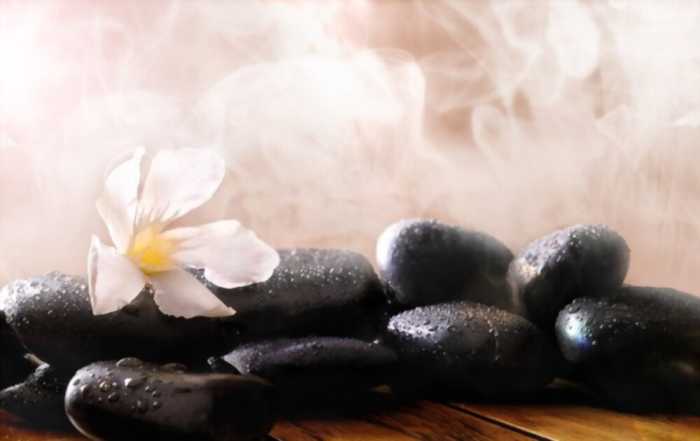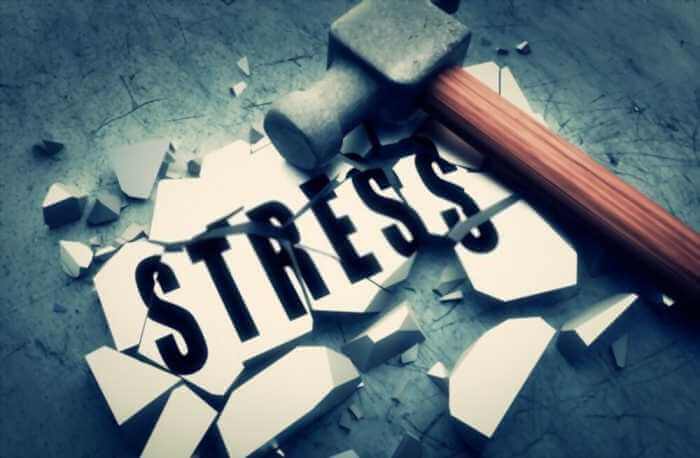What is Stress?
In order to perform optimally, we need a certain amount of tension and therefore stress. Tension can cause positive stress, as evoked by pleasant events, such as before a competition or for a holiday. This tension disappears after some time and the body returns to a state of rest.  On the other hand, negative stress occurs if tension is not in the interest of a person and is experienced as a bad event. Negative tensions are usually more intense and may last for a longer period of time. The associated long-term effects on the central and autonomic nervous system pose a major health risk.
On the other hand, negative stress occurs if tension is not in the interest of a person and is experienced as a bad event. Negative tensions are usually more intense and may last for a longer period of time. The associated long-term effects on the central and autonomic nervous system pose a major health risk.
What is the function of Stress?
The primary function of stress is survival. When faced with “danger”, the body reacts immediately by producing more adrenaline. This stress hormone enables us to quickly decide (preferably without thinking) how to deal with the presented situation: fight or flight. Adrenaline causes increased heart rate and muscle tone, and blood flows faster. The body is ready for action!
Cortisol is the 2nd phase hormone that is produced in stressful situations. Due to its role in continued functioning of the immune system, digestion and sleep, cortisol also supports the body in a continuous fight or flight situation and provides the strength to keep going. The production of cortisol differs per occasion.
What you may not know is that cortisol is also produced at night when an important, exciting task awaits the next day. The body is already preparing subconsciously.
In short: adrenaline puts the body on edge, ready for action, and cortisol keeps you able to cope with the pressure of stress.
Both adrenaline and cortisol are necessary for the body to function properly in our normal daily activities: adrenaline enables us to initiate every movement we make and cortisol ensures that we wake up well after sleeping.  But did you know that adrenaline kicks are addictive? The point is, to restore hormone balance, the body makes cortisol just after an adrenaline spike. However, when this happens throughout the day, day in – day out, the body becomes exhausted and more prone to depression, anxiety and other conditions. Prolonged production of cortisol depletes the body, which leads to chronic stress. Consequently, it’s very important for your overall health to recover properly from mental and physical activities, and cortisol production is reduced. Regular exercise can be a beneficial aid in this regard.
But did you know that adrenaline kicks are addictive? The point is, to restore hormone balance, the body makes cortisol just after an adrenaline spike. However, when this happens throughout the day, day in – day out, the body becomes exhausted and more prone to depression, anxiety and other conditions. Prolonged production of cortisol depletes the body, which leads to chronic stress. Consequently, it’s very important for your overall health to recover properly from mental and physical activities, and cortisol production is reduced. Regular exercise can be a beneficial aid in this regard.
What is Cortisol?
Think of cortisol as your natural built-in alarm system. This stress hormone works with the parts of the brain that control mood, motivation and fear.
Cortisol has many good properties: it regulates wake and sleep rhythm, digestion and immune system. As mentioned, we all need some stress to function properly and its effects may not seem disastrous in the short term.  You will survive a few bitten nails or some tension in the shoulders. But make no mistake! The insidious long-term consequences can be devastating and quite harmful to your body.
You will survive a few bitten nails or some tension in the shoulders. But make no mistake! The insidious long-term consequences can be devastating and quite harmful to your body.
Chronic stress keeps cortisol levels in the blood high, depleting the immune system. Adverse effects may manifest themselves physically, psychologically or in behaviour. Not noticing your body’s signals or not acting in time may induce complaints such as chronic fatigue, anxiety disorders, insomnia, depression, reduced libido, reduced immune function, diabetes, obesity and cardiovascular disease.
Physical consequences of stress
Impaired immune system
The body’s parasympathetic nervous system regulates the natural balance between exercise and relaxation. During prolonged stress, the cortisol level remains structurally high and the body is not given time to restore that natural balance. The overproduction of cortisol eventually comes at the expense of other bodily functions, such as a decreased production of white blood cells, which impairs the immune system.
Headache, neck and back problems
One of the most common complaints of stress is headache. Tension is caused by the muscles around the forehead, neck, shoulders and sometimes the back. Prolonged stress may, often unnoticed, lead to tightened muscles in the neck, shoulders and back. Eventually leading to sore and painful muscles.
Increased heart rate & rapid breathing
 Stress hormones cause a faster heart rate in order to supply the muscles with oxygen more quickly, causing (temporarily) increased blood pressure and rapid breathing. This is necessary during stressful situations, but here too: overload can have unpleasant consequences for health. It can lead to high blood pressure, palpitations or irregular heartbeat. While improper breathing, aka “dysfunctional breathing pattern”, can cause shortness of breath, chest pressure, palpitations, tingling or dizziness.
Stress hormones cause a faster heart rate in order to supply the muscles with oxygen more quickly, causing (temporarily) increased blood pressure and rapid breathing. This is necessary during stressful situations, but here too: overload can have unpleasant consequences for health. It can lead to high blood pressure, palpitations or irregular heartbeat. While improper breathing, aka “dysfunctional breathing pattern”, can cause shortness of breath, chest pressure, palpitations, tingling or dizziness.
Memory & sleep
Stress gnaws at the brain, which affects memory. Prolonged stress causes the hippocampus, the area of the brain that regulates our mood and response to stress, to shrink.  In addition to concentration problems or not being able to remember things, decisiveness and planning also decline. Stress hormones cause restlessness and anxiety, worrying especially at night results in insufficient rest and overstimulation. The recipe for a vicious cycle!
In addition to concentration problems or not being able to remember things, decisiveness and planning also decline. Stress hormones cause restlessness and anxiety, worrying especially at night results in insufficient rest and overstimulation. The recipe for a vicious cycle!
Digestion & blood sugar levels
Slowed digestion is a result of stress, as more blood is pumped to the muscles to provide energy. Prolonged stress may lead to weight loss, but also to binge eating and cravings for sweets, due to imbalanced blood sugar levels. This in turn can lead to fatigue, irritability and headaches.
Better safe than sorry
Stress and psychological complaints often go hand in hand. Due to the disruption of certain brain areas and the hormone balance, long-term stress can cause depression, anxiety disorders and burnout, a condition in which people are completely exhausted mentally, emotionally and physically.  Obviously it is advisable to reduce stress in case of psychological complaints. But why deplete the body until you drop? Knowing that prolonged stress can trigger a real chain reaction of health problems, it is better to prevent or at least limit the damage by reducing stress. Healthy daily habits can help a lot, for example by maintaining a stable sleep-wake cycle, eating regularly and healthily and ensuring plenty of exercise.
Obviously it is advisable to reduce stress in case of psychological complaints. But why deplete the body until you drop? Knowing that prolonged stress can trigger a real chain reaction of health problems, it is better to prevent or at least limit the damage by reducing stress. Healthy daily habits can help a lot, for example by maintaining a stable sleep-wake cycle, eating regularly and healthily and ensuring plenty of exercise.
Aromatherapy
The holistic approach takes a person as a whole – body, mind, soul and emotions – into account to achieve optimal health and wellness by finding the right balance. The interdependent parts influence each other, imbalances (physical, emotional or spiritual) can have a negative impact on overall health. The good news: this also works in reverse. Physical recovery can be accomplished by addressing the emotional part. This is where aromatherapy comes into play.
Our sense of smell is directly linked to our brain. The received olfactory signals are passed on to the part of the brain where the sense of smell is located. The brain can perceive ten thousand different smells, the sense of smell has by far the greatest capacity of all the senses. Without the smell, most food would taste boring, think about when your nose is blocked due to having a cold.
Ironically, our sense of smell is the least developed, compared to our other four senses. We are often unaware of smells around us, and mainly notice sudden changes in smell that can trigger certain reactions. The unexpected smell of smoke or gas warns us and soon sends us in search of the source. The smell of freshly baked bread when you walk into a bakery beckons you to buy, while freshly baked apple pie indoors, spreads that wonderful scent which evokes memories of cosy winter evenings and holidays.
Impulses from our senses end up in the limbic system, a part of our brain that is involved in emotion and motivation. This explains that scents can arouse all kinds of different emotions, including comfort, fear, sadness, joy, anger, sensuality and even fear. A particular scent is often associated with events that evoke memories, you may experience a certain scent as unpleasant because it brings back less pleasant memories, or you may find a scent irresistible thanks to a beautiful memory. Basically this is how aromatherapy works.
Basically this is how aromatherapy works.
Aromatherapy works through the sense of smell as well as by absorption into the skin by using essential oils. Each essential oil has a range of unique healing properties, uses and effects. With a blend of different essential oils, the individual benefits of each can be enhanced or extended.
Aromatherapy has an array of benefits. It’s used to manage pain, improve sleep quality, reduce stress, agitation and anxiety, soothe sore joints, treat headaches and migraines, alleviate side effects of chemotherapy, ease discomforts of labour, fight bacteria, virus, or fungus, improve digestion, boost immunity. Applying aromatherapy can be done in a variety of ways, such as using body oils, creams or lotions for topical application or massage, baths, facial steamer, diffuser, hot and cold compresses. Each can be used individually or in any combination.
Lavender essential oil
Lavender oil is a favourite oil in aromatherapy and valued for its calming effects on the mind and body due to its ability to reduce anxiety. It can help with mild insomnia and improve sleep quality. For women with post-partum depression, aromatherapy with lavender oil has been shown to reduce anxiety and depression. But also in medical settings, such as dental practices, the intensive care unit and during preparations for surgery, lavender helps to relieve tension.
Bergamot essential oil
Another well-known oil in aromatherapy. 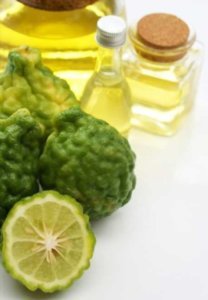 Bergamot essential oil can reduce stress and promote relaxation. Bergamot can also improve negative emotions and fatigue and lower cortisol levels. For topical application, such as with massage, bergamot oil should always be diluted with a carrier oil (jojoba, sweet almond or argan) and applied sparingly to the skin or added to a bath. With a few drops of oil on a cloth or tissue, or in a diffuser, the soothing scent can also be inhaled.
Bergamot essential oil can reduce stress and promote relaxation. Bergamot can also improve negative emotions and fatigue and lower cortisol levels. For topical application, such as with massage, bergamot oil should always be diluted with a carrier oil (jojoba, sweet almond or argan) and applied sparingly to the skin or added to a bath. With a few drops of oil on a cloth or tissue, or in a diffuser, the soothing scent can also be inhaled.
Bergamot may irritate the skin and make it more sensitive to sun exposure.
Lemongrass essential oil
For natural relief of anxiety, inhaling the scent of lemongrass essential oil is found to promote relaxation and reduce anxiety symptoms. This oil showed immediate reduction in anxiety and tension, and quick recovery from anxiety-inducing situations. Use lemongrass oil sparingly and always diluted with a carrier oil for application onto the skin.
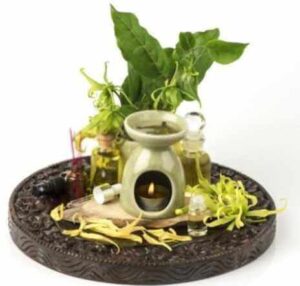 Ylang-ylang essential oil
Ylang-ylang essential oil
Inhaling the scent of ylang-ylang essential oil has been found to lower blood pressure and stress hormone levels. Although ylang-ylang has a relaxing effect, it is advisable not to use it before an exam. One study compared the aroma of ylang-ylang with that of peppermint. While peppermint improves memory, ylang-ylang calms the nerves, but at the same time reduces the functioning of memory and slows down processing speed.
Jasmine essential oil
The gorgeous floral scent of jasmine oil can promote a sense of well-being and romance. Unlike some other essential oils used for anxiety, jasmine oil appears to calm the nervous system without causing sleepiness. Inhale jasmine oil directly from the bottle or allow the scent to fill the room through a diffuser.
Patchouli essential oil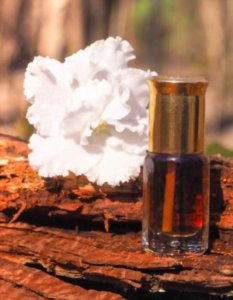
Musky patchouli is used in Ayurvedic healing practices relieving anxiety, stress and depression, often combined with other essential oils such as lavender. Patchouli essential oil promotes calm and relaxation. To relieve anxiety, patchouli can be inhaled directly, diffused through a vaporizer, or added diluted to a warm bath.
Amber essential oil
Amber oil has quite a few impressive benefits, these include calming the mind, protecting heart health, stimulating the libido, eliminating pain, increasing circulation, treating respiratory disorders, preventing inflammation, boosting the brain and detoxifying the body. This essential oil is ideal for the treatment of anxiety, stress, chronic pain, fatigue, cognitive slowness, neurodegenerative diseases, dementia, arthritis and various cardiovascular conditions. Despite being a relaxing oil, it does have stimulant properties that can encourage blood flow. Amber oil is commonly rubbed into the skin of the extremities to promote better circulation.
Inhaling this oil, adding a few drops to a warm bath, or diluted for a massage, can be a great way to calm the mind, soothe the body, allow for a good night’s sleep and wake up refreshed.